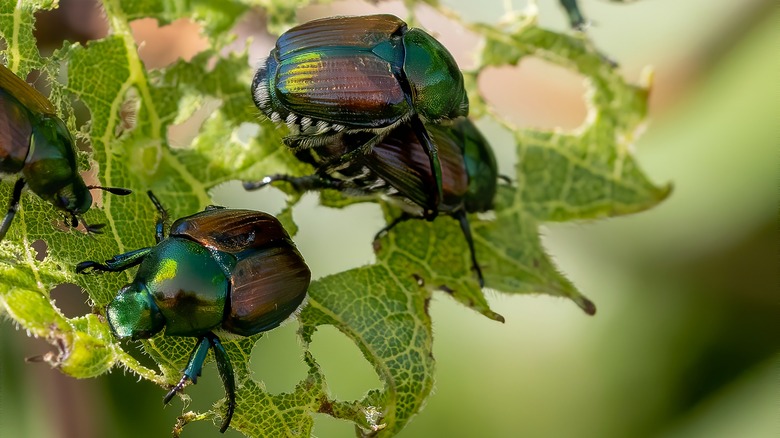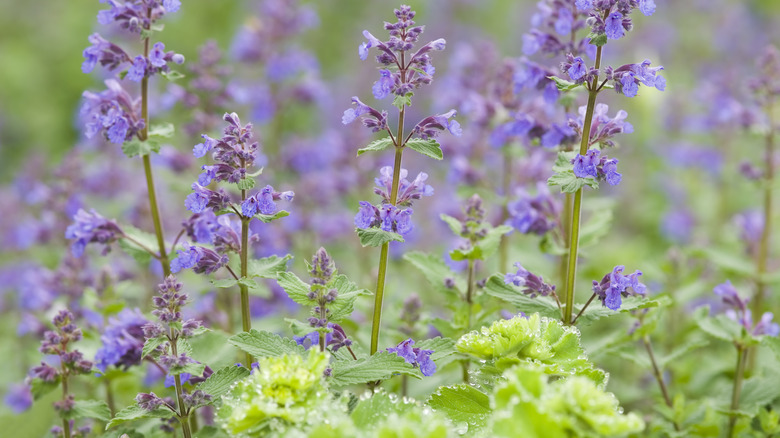Plant This Common Herb In Your Garden To Help Keep Japanese Beetles Away
In your quest to fend off garden pests, catnip can be a surprising but effective ally, especially against Japanese beetles. These are invasive pests with a metallic blue-green head and copper-brown wing covers, typically around half an inch in length. Originating in Japan, they've become widespread in many regions of the United States. Interestingly, these beetles have a broad palate, extending far beyond what any gardener would like. They are voracious eaters, gnawing their way through more than 300 types of plants, turning leaves into skeletons, and demolishing flowers in the process. They can completely defoliate a plant, impacting its appearance, overall health, and photosynthesis ability. When these pests plague your garden, you're essentially fighting a losing battle against plant deterioration. Some of their favorite victims include fruit trees and tomatoes, but they also won't shy away from feasting on corn, beans, and a variety of flowering plants. Given their destructive nature, finding a non-chemical way to deter them is highly desirable for many gardeners.
This brings us to catnip and its role as a guardian of your garden. Scientifically known as Nepeta cataria, this perennial herb is a member of the mint family and has a long history that traces back to Europe and Asia. If you want a more natural, eco-friendly solution to your beetle problem, growing catnip in your garden will help.
Why catnip repels Japanese beetles
While catnip is famously known for captivating cats in a euphoric state, it also plays a more discreet yet equally impressive role as a natural insect repellent. Specifically, its aromatic potency, which proves irresistible to cats, works wonders in keeping bugs like Japanese beetles away from your garden. Researchers have found that catnip is rich in a chemical compound called nepetalactone. Remarkably, this compound is more effective at repelling insects than DEET, which is the active ingredient in many commercial insect repellents. One 2014 study suggests potential anti-fungal properties, giving you another reason to consider this plant for your garden (via Science Direct).
When you plant catnip in your garden, you're essentially installing an organic, non-toxic pest control system. The herb repels Japanese beetles effectively, causing them to steer clear of other plants in the vicinity as well. Yet, there's a flip side to consider. This strong aroma of catnip that works so well at deterring pests can also act as a beacon for stray cats. They might wander into your garden, drawn in by the aroma, and even start nibbling on the leaves. While some might find this charming, it could become problematic if you don't want to attract stray animals. If this downside is significant for you, other pest-repellent plants like lavender or marigolds could align more with your gardening goals. These alternatives still help keep pests at bay but are less likely to attract the local feline population.
Implementing catnip as a beetle repellent in your garden
You have two primary routes to effectively use catnip as a natural repellent against Japanese beetles: growing catnip plants in your garden or using dried catnip. If you opt for planting, select a spot with well-drained soil and exposure to full to partial sunlight. Catnip is a hardy plant that can tolerate various conditions, making it a low-maintenance option for your garden. Once the plant matures, you can either harvest the leaves for immediate use or dry them for future application.
Dried catnip also offers a quick and effective solution if you're dealing with a pressing Japanese beetle issue. Simply sprinkle the dried leaves directly onto the affected plants. This method is especially useful for immediate concerns, as it can produce results quickly without waiting for a plant to grow. Strategically growing catnip near plants like tomatoes, which are particularly attractive to Japanese beetles, enhances its effectiveness. This companion planting approach serves a dual purpose. Not only does it deter beetles, but the strong aroma of catnip also camouflages the scent of your other plants. This makes it challenging for additional pests to locate them, offering a broader spectrum of protection for your garden.


